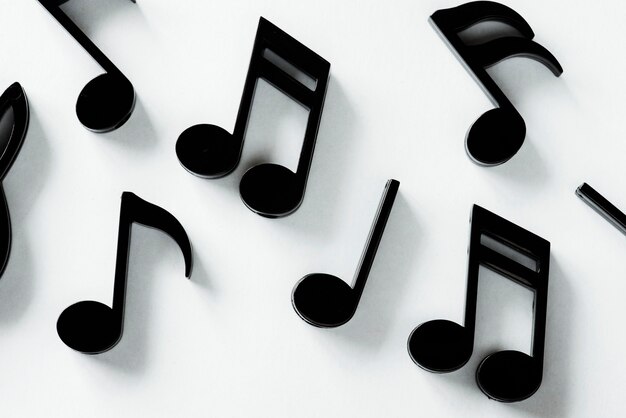In jazz and popular music, the bass clef plays a crucial role, serving as the foundation for rhythm and harmony.
It guides bass players, pianists, and other lower-pitched instrument musicians to create the rich, deep tones that give these genres their distinctive groove and emotional depth.
Whether it’s the walking bass lines in jazz or the driving bass riffs in popular songs, the bass clef is essential for notating and performing the music that sets the mood and keeps the beat, making it an indispensable part of these vibrant and ever-evolving musical styles.
Historical Context of Bass Clef in Jazz and Popular Music
The bass clef has been a fundamental aspect of jazz and popular music since its inception. In jazz, originating in the early 20th century, the bass clef notes formed the backbone of the genre’s distinctive swing and improvisation.
Bassists read these notes to create walking bass lines that move smoothly through scales and chords, providing a rhythmic and harmonic foundation for the ensemble. In pop music, the bass clef has played a similarly vital role.
It allows for the transcription of catchy bass riffs and grooves that define many memorable hits. Over the years, as both jazz and pop evolved, the bass clef continued to be a key tool for musicians, enabling them to anchor their music in rich, resonant tones that resonate with listeners.
Role of Bass Clef in Jazz Improvisation
The bass clef provides a framework for bassists to create inventive and rhythmically complex lines that complement and interact with other instruments. Here are two examples:
Walking Bass Lines:
In a classic jazz setting, a bassist might use the bass clef to read a chord chart and then improvise walking bass lines. These lines typically consist of quarter notes that smoothly connect the chords of a progression.
For example, in a 12-bar blues in B♭, the bassist might improvise a line that starts with the root note B♭ (notated in the bass clef), moves to the fifth (F), approaches the next chord (E♭) chromatically from below (D), and so on, weaving a continuous and melodic line that outlines the chord changes.
Bebop and Modal Jazz:
In more complex jazz styles like bebop or modal jazz, bassists use the bass clef to navigate intricate chord progressions or modal frameworks. In a bebop piece, the bass might play a mix of root notes, chord tones, and chromatic approaches, creating a more harmonically dense line.
For instance, over a Dm7-G7-CMaj7 chord progression, the bassist might start on the D note (notated in the bass clef), add chromatic passing tones, and use arpeggios to outline each chord, resulting in a sophisticated and interactive bass part.
Bass Clef Techniques in Popular Music Production
In popular music production, the bass clef plays a key role in creating the foundation of a song’s harmonic structure and rhythm. One notable technique, essential for music producers, involves learning bass clef notes to proficiently craft synthesized bass lines, a common practice in genres such as pop, hip-hop, and electronic dance music (EDM).
Synthesized Bass Lines in EDM
In EDM, producers often use synthesizers to create powerful and catchy bass lines notated in the bass clef. These bass lines are typically simple in rhythm but rich in texture, providing both a rhythmic and harmonic foundation for the track.
For instance, a producer might use a synthesizer to play a repetitive, pulsing note pattern in the bass clef, such as playing on the root notes of the chord progression.
This technique, often combined with side-chain compression linked to the kick drum, creates a dynamic, driving feel that is fundamental to the genre. The bass clef notation guides the producer in creating these lines, ensuring they align with the song’s key and chord progression, and contributing to the overall energy and mood of the track.
Influence of Bass Clef in Modern Jazz and Fusion
Modern jazz and fusion, known for their inventive and eclectic styles, make extensive and innovative use of the bass clef. Here are two examples that illustrate this:
Modal Jazz Exploration:
In modern jazz, particularly in modal jazz styles popularized by artists like Miles Davis and John Coltrane, the bass clef becomes a canvas for exploration beyond traditional chord progressions. For example, in a piece like “So What” from Davis’ album “Kind of Blue,” the bassist uses the bass clef to navigate a series of modal scales.
The bass line, primarily centered around the D Dorian mode for the first section and E♭ Dorian for the second, provides a repetitive yet hypnotic foundation. This approach in the bass clef allows the bassist to create a groove that is both anchoring and liberating, giving soloists a vast harmonic space to improvise over.
Fusion Genre Blending:
Infusion genres, which blend elements of jazz with rock, funk, and world music, the bass clef is essential for creating complex and groovy bass lines. Take, for instance, the work of Jaco Pastorius with Weather Report. In their song “Birdland,” the bass clef is used to notate a bass line that is rhythmically intricate and harmonically rich, incorporating elements of funk and jazz.
Pastorius’ use of the bass clef here is not just about playing notes; it’s about creating a rhythmic pulse and melodic counterpoint that drives the song and adds to its distinctive fusion sound.
Wrapping Up
In jazz and popular music, the bass clef has been more than just a notational symbol; it’s been a gateway to creativity and rhythm. In jazz, it’s the backbone of the groove, guiding bassists through swinging walking bass lines and intricate improvisations. In pop music, the bass clef shapes the foundational riffs and hooks that get listeners moving.
This clef isn’t just about low notes; it’s about setting the tone, mood, and pulse of a piece. Whether it’s underpinning a smooth jazz melody or driving a catchy pop chorus, the bass clef is essential in bringing music to life.
Isn’t it remarkable how a few lines and spaces can resonate so deeply with our musical experience?
Read Also:
- These Music Streaming Services Can Get Your Groove On
- Country Music Wins Big At The 2023 Billboard Music Awards
- How To Promote Live Music Events For Your Bar






















